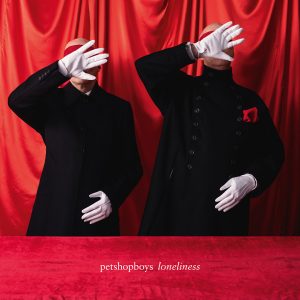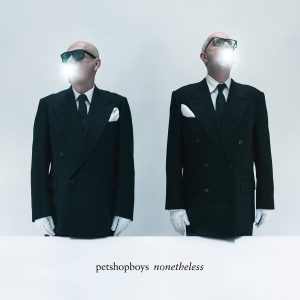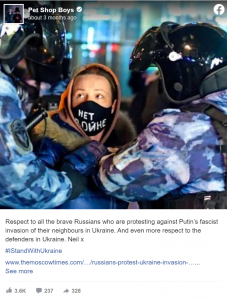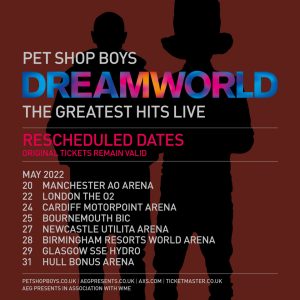Less than a year since their last album, and newly separated from EMI, Pet Shop Boys return with Electric, out today on their own label, X2. In the year that saw David Bowie pull off one of the greatest ever acts of musical prestidigitation and Daft Punk mastermind a thrilling old-school chart-busting comeback, it’s fitting that Neil Tennant and Chris Lowe [pictured, right] have just unleashed what might be the most dynamic sounding record of their 30-year career.Produced by Stuart Price (Madonna and The Killers, remixer of everyone from Coldplay to New Order), Electric roars out of the traps with ‘Axis’ – a throbbing slice of electro that joins the dots between PSB’s early hi-energy Bobby Orlando experiments, late Eighties house and contemporary electronica – and simply doesn’t let up. It’s also a thrilling love letter to the potency and possibility of pop music, all turbocharged synths, euphoric builds and expertly crafted breakdowns. It is, in fact, pretty much the perfect Pet Shop Boys album, and perhaps the perfect pop record full-stop, for anyone who still cares about such things. GQ caught up with Chris Lowe, currently in the midst of a colossal world tour, to find out how it happened. GQ: You’re in Sweden…Chris Lowe: We are. We’ve just come from the hustle and bustle of Tel Aviv and we’re on an island outside Stockholm, so it’s quite a contrast. That became slightly controversial, your appearance in Israel. Didn’t Neil have to put a statement out?I don’t know if he had to put a statement out… perhaps Neil’s more of a statement-maker than I am. We talked about Pussy Riot last time we spoke.Did Neil make a statement about that too? [laughs] Do you want to make a statement about anything now?Not really. I’ve got nothing to get off my chest. I think your new album Electric is your third best, after Please and Behaviour. It sounds amazingly fresh. It also feels like a bit of a Chris Lowe album…Third best? [laughs] It’s definitely a Pet Shop Boys album, though it’s very different to the two you mentioned. I suppose it draws upon some of the sounds and energy of the first album. But Electric could only have been made now. The sounds, the recording techniques are so contemporary, and that comes from working with Stuart Price. He’s the perfect producer for us. He’s a lot of fun, he’s very quick, and he really understands us. You can feel and hear that in the music. We like working with other people, adopting a team approach in everything we do. There’s always so much to learn. There are new ways of doing things coming along constantly. You don’t want to exist in your own little world. There are some amazing sounds on the album…I think this is the most sonically ambitious album we’ve ever done. It’s also the least song-based album. There are obviously songs on it, but not in the traditional verse/chorus sense. Even the most structurally conventional one, ‘Love Is A Bourgeois Construct’, is a series of verses with no chorus. We definitely freed up our songwriting. Stuart has a vast collection of old analogue synths, but he marries all that to the latest sound manipulation software. So there’s some absolutely crazy stuff going on, acid noises, squelches… and that produces an incredible energy across the whole album. And there are no ballads to get in the way. It’s a great album for driving to. Wherever you’re going, you’ll get there twice as fast. Electric has a very ‘Berlin’ feel and you have a studio in that city…We have a little place there. It’s a great city, it reminds us of New York when you used to go there in the Eighties. It’s got that mix of artists and a great club scene. It still feels anarchic. You don’t get that sense of being monitored by CCTV 24 hours a day. It’s a very liberating city to be in, and it doesn’t frazzle you the way London can. We tend to watch more bands there, too, and then there’s the chin-stroking electronic music scene, which we dip into. And we go to Berghain [legendary Berlin nightclub in a former power station], for a few drinks in the Panorama bar. We treat it as a pre-Sunday lunch drinks opportunity. [laughs] There’s a Chris Lowe talkie bit on ‘Thursday’. You know there’s a certain strata of PSB fan who loves a Chris Lowe talkie bit.Yes. [sheepishly] Well I do them and then get embarrassed, you see. But Stuart really liked it. It’s me saying the days of the week. I can do lists, I suppose. I’ve sung on the odd obscure B-side but I can’t stand the sound of my own voice. We had dinner with Brandon Flowers recently, a whole load of us, and he started singing ‘Paninaro’ at me. Which was quite a strange moment. ‘Vocal’ has an unbelievably euphoric feel and sense of build. ‘Everything about tonight feels right and so young/and anything I’d want to say out loud will be sung’. The video captures the spirit of the original race scene beautifully. Can you believe it’s 25 years since The Second Summer of Love?I know! It’s an historical video piece. It seems like yesterday. But that video is just fantastic. The guy who directed it, Joost Vandebrug, put together a collection of footage he’d compiled, showed it to us, and we just said, ‘oh that’s great, finish it’. It’s found footage, so it has that wonderful grainy feel. Videos don’t need to be huge, glossy £100,000 productions these days.I have no idea how much it cost. [pause] I suppose I ought to find out. I don’t think it’ll be terribly expensive. It’s certainly not a Will.i.am video. [laughs] We wouldn’t be able to afford that. The sheer energy that comes off the video is so infectious. I was struck by the hairstyles too… I grew mine exactly like that at the time.The curtain hair, you mean? I’m always amazed how people manage to get the haircut of the time instantly. That haircut that’s all the rage right now, all the TOWIE lot have got it. One minute it’s long, then it’s short, then it’s long again. How do they do it? We were in Manchester the other week, and literally everyone seemed to have the haircut. Mind you, it’s not just in England, it’s global. We’ve noticed that on our travels. Does this renewed energy come from having set up your own label, X2, after 28 years with EMI?Well, we’ve always had a lot of freedom. But we have even more now. We’re not signed to a big label, where they effectively own you. For example, ‘Vocal’ is too long to be chart eligible, so we’re not playing by any of the rules. Even the music on Electric doesn’t really fit in with the rules of what a pop song is supposed to be. But the internet has obviously changed all that. You can upload a video to Youtube and get 250,000 views in a couple of days. In return for about 45p in royalties…I’ve no idea what royalties it would generate. That’s something else I have no idea about. It was much easier back when you just released a single. The digital marketing now is so complicated. You do feel like you’re just giving a lot of it away. That said, I like the ease with which you can find stuff now, particularly dance music, on Beatport and so on. I like the fact that you can be in Selfridges menswear department, which generally plays great music, hear something, use SoundHound or whatever it’s called to work out what it is, and buy it then and there. I like the convenience of it all. Although there is still that idea that when something is really hard to get, you treasure it more when you find it. A friend of mine finally found a Northern Soul single for me that we used to listen to in Blackpool in the Seventies. I’d been searching for it for 20 years.Do you feel a slight melancholy now that this elusive object is finally yours or just pure elation?[laughs] I immediately digitised it and put it on my iTunes. Now it’s languishing on a shelf somewhere. 2013 is the year of the secret comeback. Bowie did it brilliantly, defying all the rules, as did Daft Punk. What do you think of Random Access Memories?It’s a bit too retro for me. What I always loved about Daft Punk was there modernism. The drum sounds are very retro. But I love Nile Rodgers. Have you read his book [Le Freak]? Fantastic story. One of the things I really took from it was how the record company always seem to be trying to stop him from releasing something that goes on to be their biggest selling record ever. ‘Haven’t you got anything better? Are you trying to kill Diana Ross’s career? What the hell are you playing at?’ Then it turns out to be her best-selling album. The lesson clearly is, do your own thing. You need someone with a strong idea about what they want to do. All the best design and music comes from that.
Taken from: GQ Magazine
Interviewer: Jason Barlow





